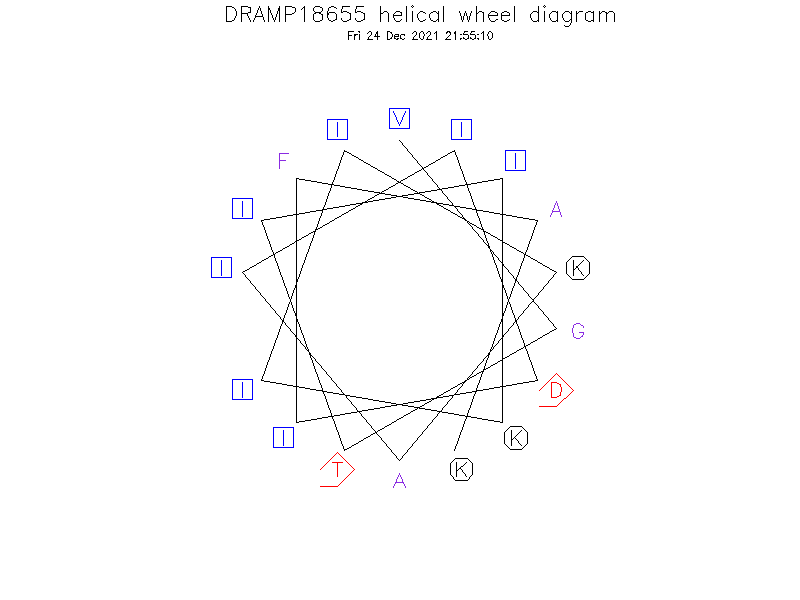General Information
-
DRAMP ID
- DRAMP18655
-
Peptide Name
- dPSMα4 (PSMα4 peptide derivative; bacteriocin; staphylococcus aureus, bacteria)
-
Source
- Truncated the peptide PSMα4 (from Staphylococcus aureus)
-
Family
- Belongs to the phenol-soluble modulin alpha peptides family.
-
Gene
- psmA4
-
Sequence
- VGTIIKIIKAIIDIFAK
-
Sequence Length
- 17
-
Protein Existence
- Protein level
Activity Information
-
Biological Activity
- Antimicrobial, Antibacterial, Anti-Gram+
-
Target Organism
-
- [Ref.22371493]Gram-positive bacteria: Streptococcus serotype GAS M3 strain 4041-05 (MIC=10 μM).
-
Hemolytic Activity
-
- [Ref.22371493]52% hemolysis at 10μg/mL against human red blood cells
-
Cytotoxicity
-
- Not included yet
-
Binding Target
- Not found
Structure Information
-
Linear/Cyclic
- Not included yet
-
N-terminal Modification
- Not included yet
-
C-terminal Modification
- Not included yet
-
Nonterminal Modifications and Unusual Amino Acids
- Not included yet
-
Stereochemistry
- Not included yet
-
Structure
- Not found
-
Structure Description
- Not found
-
Helical Wheel Diagram
-
PDB ID
- None
-
Predicted Structure
- There is no predicted structure for DRAMP18655.
Physicochemical Information
-
Formula
- C90H158N20O21
Absent Amino Acids
- CEHLMNPQRSWY
Common Amino Acids
- I
Mass
- 1856.37
PI
- 9.7
Basic Residues
- 3
Acidic Residues
- 1
Hydrophobic Residues
- 11
Net Charge
- +2
-
Boman Index
- 1808
Hydrophobicity
- 1.518
Aliphatic Index
- 189.41
Half Life
-
- Mammalian:100 hour
- Yeast:>20 hour
- E.coli:>10 hour
Extinction Coefficient Cystines
- 0
Absorbance 280nm
- 0
Polar Residues
- 2
DRAMP18655
Comments Information
Function
- Antibacterial activity against Gram-positive bacteria. Peptide which can recruit, activate and subsequently lyse human neutrophils, thus eliminating the main cellular defense against infection. Stimulates the secretion of the chemotactic factor interleukin-8 (IL-8). The ensuing activation process triggers an inflammatory response in the host, thus contributing greatly to virulence. Also possesses hemolytic activity, which may contribute to the development of disease. Peptide production is higher in most prevalent community-associated MRSA strains than in hospital-associated MRSA strains.
Induction
- Up-regulated by agr.
Literature Information
- ·Literature 1
-
Title
- Novel phenol-soluble modulin derivatives in community-associated methicillin-resistant Staphylococcus aureus identified through imaging mass spectrometry.
-
Pubmed ID
- 22371493
-
Reference
- J Biol Chem. 2012 Apr 20;287(17):13889-98.
-
Author
- Gonzalez DJ, Okumura CY, Hollands A, Kersten R, Akong-Moore K, Pence MA, Malone CL, Derieux J, Moore BS, Horswill AR, Dixon JE, Dorrestein PC, Nizet V.

